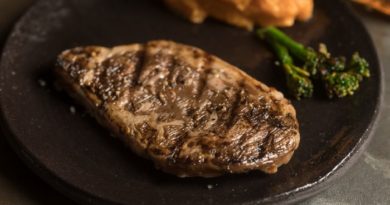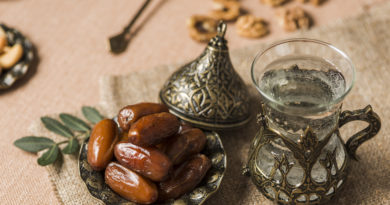A Kosher Cheeseburger? Can Real Dairy Be Pareve?
Vegans seek alternatives to traditional dairy products for two reasons: health (lactose intolerance, milk allergies) and ethical concerns (treatment of dairy cows and calves). Until recently, the alternatives have been based on beans, nuts and grains: soy milk being the most well-known, but others include almond, cashew, macadamia, walnut, rice, oat, hemp, and pea. These have grown in popularity and account for nearly all the growth in milk sales (plant based milk sales grew 14% while cow milk sales declined over two years from 2017-2019 and has sales of $2 billion — about 14% of all dollar sales of retail milk. (SPINSscan Natural and Specialty Gourmet as reported by the Good Foods Institute). Other plant-based dairy shows similar growth trajectories, including cheeses and ice cream.
However, despite their success, and in many cases excellent taste, none fully replace the taste and mouth feel of dairy. While in beverages and cereal, they are quite acceptable, in cheeses and ice cream, the substitutes are noticeably less creamy and lack many of the characteristics of true dairy products. Enter cultured dairy.
Milk is composed of proteins (casein and whey), water, and fat. The flavor will vary depending on the origin of the cows (or other mammal) and what they eat, but proteins, water and fat are the essential building blocks of milk. Several companies around the world are working to produce milk in the lab by coaxing yeasts, bacteria or fungi to make the proteins that can be combined with water and vegetable oils to produce a real dairy milk without cows that is 100% vegan. Making the proteins is not unlike brewing beer: adding sugars and other nutrients to microflora, but instead of alcohol and carbon dioxide, the product is casein and whey, without lactose, cholesterol, hormones, or antibiotics. These products are not “plant-based” but they are vegan. While most companies are using yeasts to make proteins, at least one Aussie company, Nourish Ingredients, wants to create animal fats using a similar process. Thus a complete non-dairy milk made with real milk protein and fat is possible.
GMOs, Animal Welfare, and Allergens
First, to get microflora to make these proteins requires genetic manipulation, so while they are GMOs, the resulting proteins are not. Second, milk allergies are reactions to proteins, so it is quite possible or even likely that people with milk allergies will not be able to safely consume these products, and anything produced from them will have to declare milk or milk protein as a declared allergen. However, they would not be an issue for people with lactose intolerance, since the products do not have lactose. It should be noted that the DNA can be obtained non-invasively (from hair or cheek swabs) and in some cases are already catalogued in scientific databases. Other than this, animals are not involved in the process and that has many implications.
Environmental Impact
Environmentally, this means that the entire production process of milk is disrupted: growing feed, keeping cows impregnated all the time, separating calves immediately after birth (causing emotional distress), artificial hormones to increase milk production, and greenhouse gases from grain-fed cows. A factory producing proteins may not be as evocative of nature as an idyllic cow pasture, but its environmental impact is significantly better.
Kosher Status & Implications
Like any manufactured product, these proteins would probably require kosher certification. However, there are no real kashrut issues. Genetic modification using DNA does not create any kashrut issues in and of itself, and despite the fact that they are milk proteins (and would require allergen warnings as such), the proteins themselves would be pareve[1] according to Rabbi Menachem Genack at the Orthodox Union (OU). The implications of this are huge. Real milk, ice cream and cheese could be served with and after meat meals. While great inroads have been made in the market by non-dairy products, this would be a breakthrough and could revolutionize the kosher marketplace. Should the process become the prevalent way to make milk, the entire notion of separation of meat and milk might become nearly obsolete. While such a result seems speculative and far off, recent advances make it a very possible reality.
Several companies are at work developing the building block proteins to make this happen. These include Change Foods, New Culture, Germany’s Legendairy Foods, and the UK’s Better Dairy. The leading company in the US is Perfect Day; in Israel it is Re-Milk. Both Perfect Day and Re-milk will be kosher certified (Perfect Day already is certified OU-Pareve); certification of any products made with their proteins will be up to the individual manufacturers.
The kosher status of initial products will not be pareve. Cheeses and yogurts are made by adding enzymes and cultures to milk (dairy or non-dairy). Many of these are kosher certified, but only a few are pareve. Many are certified dairy or on dairy equipment, making the resulting product unfit to cook or eat with meat. Until recently, there was never a demand for pareve cultures and enzymes, but this is changing and a few are becoming available. It will take a while before a wide variety are certified pareve.
In addition, milk and milk products made with cultured proteins would most likely be processed and packaged on equipment used for regular dairy. Indeed, this is the challenge for many plant-based alternative milks, yogurts, and ice creams: although the equipment is thoroughly cleaned to remove any trace of milk from an allergen standpoint, it does not constitute a kashering that would permit a pareve designation. Interestingly, most shelf stable milks are designated pareve. Chobani Oat Milk is one of the few refrigerated milks to carry the pareve designation. So unless a special production is made, it is likely that most products will initially be considered dairy, at least until the new process becomes dominant in the market.
This may not be a bad thing however. Not long ago, a 23-year old with a dairy allergy ate in a kosher meat restaurant in Israel. She was not carrying an EpiPen and felt no need to be concerned since dairy products would never be served in such an establishment. However, a staff member mistakenly purchased dairy whipped cream and served it before anyone noticed the error. The woman went into shock and died. While it would be possible to make pareve milk, butter, cheese, and cream for cooking in a meat restaurant with cultured dairy, given the allergen concern, it may well not be prudent to do so. Manufacturers, certifiers, hospitality providers, and consumers should consider whether all such products should carry a “D” or “DE” certification with a qualifier, rather than “pareve” with an allergen warning that some might miss.
Some may also feel that despite it being a non-animal product, the mixin of dairy proteins with meat is simply too close to a violation to be permitted. The principle of ma’arit ‘ayin [2] might be applied to eating meat with a cultured dairy product, so no real cheeseburgers. So far, no product on the market has sought pareve designation, but this issue will arise soon.
Perfect Day
Perfect Day has created some limited runs of milk and kosher certified ice cream through partners Brave Robot and Graeter’s. They are currently working with partners to use their whey protein isolate in a variety of other traditional dairy products. According to Alexandra Whelan, a spokesperson for Perfect Day, their goal is to create a next generation supply chain fueled by fermentation, not animals, to make dairy foods in more compassionate, sustainable ways and ultimately support the evolution of the food system to one that is more sustainable for future generations. Both brands of ice creams currently have a “D” designation due to the production facility and possibly due to some of the flavors being designated “D.”
Remilk
Aviv Wolff, a former combat officer whose vegetarianism inspired him go into food tech, founded Remilk with Ori Cohavi, a scientist who previously worked for Israeli technology and medical companies. Together, they want to reimagine how to produce cow’s milk in a sustainable way through the production of casein and whey proteins. Chemically identical to what cows make, these are animal-free dairy products. Not targeted to vegans (although the product is vegan), the purpose is environmental sustainability: requiring only 1% of the land, 4% of the feedstock, and 10% of the water compared to traditional dairy. In a country like Israel with limited land and water, the impact on dairy production would be very significant. They plan to provide the proteins to partners who will ultimately produce products.
What’s Next?
Expect to see some dairy products over the next two years, but likely with a Dairy or Dairy Equipment status. Truly pareve products are likely to come only through small batch manufacturers or special production until scale allows these and plant-based milks to be produced on dedicated equipment. Note, however, that concerns about producing pareve real dairy may lead to manufacturers being reluctant to seek such a certification.
- Pareve foods are foods that contain neither meat nor dairy ingredients and can be eaten with either. They must be prepared (according to the prevelent tradition used in the US) on equipment that is not previously used for meat or dairy foods, or have first be kashered or purged (for most equipment this means cleaned with boiling water after being idle for 24 hours, or a corrosive chemical added to hot water immediately following prior use). Pareve is not the same as vegan, as fish, eggs, sugar and honey are all considered pareve. Foods that are other pareve that are prepared on equipment used for dairy and cleaned but not purged are considered either Dairy (designated on the kohser symbol by adding a letter “D”) or Dairy Equipment (“DE”), depending on the nature of the cleaning. Some manufacturing plants are designated Dairy and any product made there, unless purging is specially supervised, will automatically get a “D” designation.[↩]
- Essentially an act that misleads others into a mistaken conclusion that either a prohibited act is permissible, or that the person acting appears to be commiting a prohibited act.[↩]




